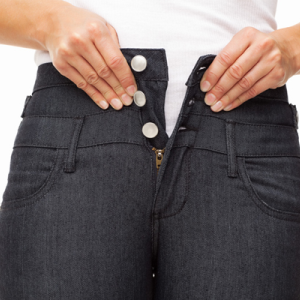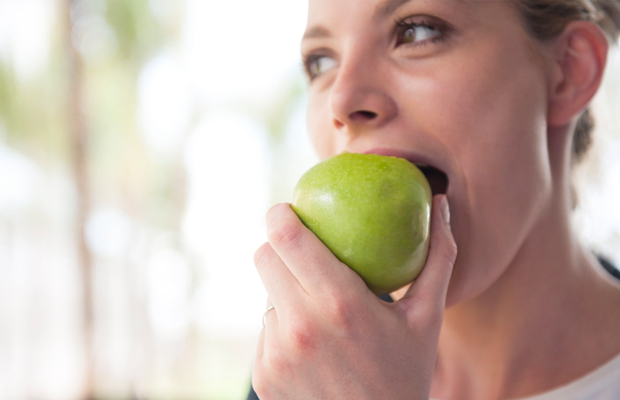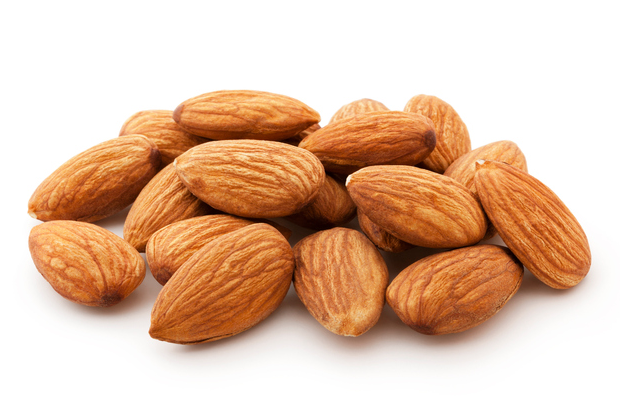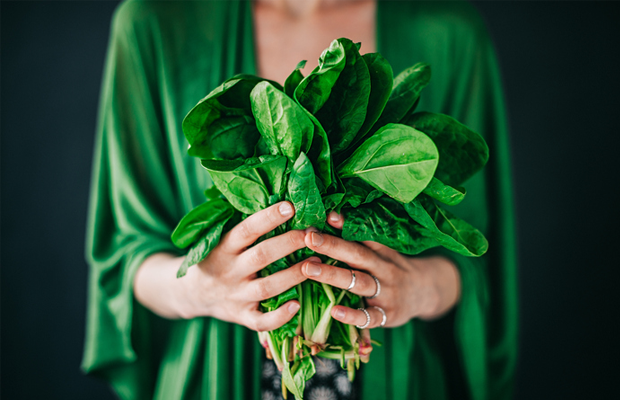
One day you’re pulling on your distressed denim with ease; the next you’re wrestling with your zipper, and wondering why the jeans you wore yesterday don’t fit anymore.
The good news: You’re likely just bloated and it happens to literally everyone. It’s totally preventable or even fixable – although it’s not like having a headache and popping some ibuprofen. Still, there are some super-simple remedies for how to reduce bloating ASAP, so you don’t have to give up jeans forever in lieu of your stretchiest pair of leggings.
1. Fill up on probiotics
Some over-the-counter probiotic supplements can cause gas, bloating, or other GI symptoms, but chowing down on real foods packed with this healthy gut bacteria can be beneficial, says Courtney Schuchmann, a dietitian at the University of Chicago Medicine.
“Yoghurt is one of the easiest ways to get probiotics in your diet,” she adds. “You can also eat fermented vegetables, like sauerkraut, or things like kombucha and kefir – but be cautious, because those products may also contain a lot of sugar, which can be counterproductive for GI health.”
Read more: 9 foods that are secretly making you super-boated
2. Stay hydrated
You’ve absolutely been told before that you should be drinking more water, but this is especially true if you find yourself bloated all the time.
Drinking water will soften your stools, which makes them easier to pass and reduces bloating in the form of gas and constipation, says Dr Matthew Bechtold, a gastroenterologist at University of Missouri Health Care. Good hydration also increases the mucous secretions in your bowels and your overall bowel motility… so drink up!
3. Watch your sodium intake
If you’re feeling bloated after an especially salty meal, you can blame the sodium – too much of it in your diet causes your kidneys to retain water.
The good news is that cutting back on sodium helps your kidneys flush out all that excess water in your body, says Dr Bechtold, which will help you lose the puffiness.
He recommends choosing fresh meats and produce over the prepackaged kinds, putting down the salt shaker at dinner in favour of flavourful spices, preparing your own meals at home instead of dining out, and reading food labels closely for sodium content. And just so you know: The Food and Drug Administration recommends consuming no more than 2 300 milligrams of sodium per day (that’s just one teaspoon of salt, FYI).
4. Add more potassium into your diet
Speaking of how sodium can make you retain water, if you’re regretting those French fries you ordered at lunch, try snacking on a potassium-rich banana to combat bloat.
“Potassium can help the kidneys get rid of salt, which may help with water retention,” says Dr Bechtold. If bananas aren’t your thing, oranges and strawberries are also good sources of potassium.
5. Don’t skip the skin on fruits
Put down the fruit peeler. In fruits like apples and pears, the skin is where you find insoluble fibre, a.k.a. the kind of fibre that aids digestion by keeping things moving through your bowels. Munching on these fruits with the skin intact, says Schuchmann, can help increase stool bulk and give you more regular bowel movements.
Read more: 12 reasons why you’re suddenly so bloated
6. Cool it on the carbonated drinks
I know, it’s amazing, but there’s a side effect to all that no-cal sipping you’ve been doing at your desk every day: It could be causing belly bloat.
“Carbonated beverages may add air in the GI tract,” says Dr Bechtold. “The more air that is trapped, the more bloating [you’ll have].” Replace some of your sparkling water with the flat bottled or tap kind, and see if there’s any improvement.
7. Work up a (light) sweat
You don’t have to go for a 10km run every day, but fitting in some regular physical activity might keep things moving more smoothly in your tummy.
According to Dr Bechtold, there are two reasons why a short walk-especially after eating a big meal-can significantly reduce bloating. First, exercise increases the motility of your colon, which reduces the amount of time your stool sits in your belly making gas. Secondly, exercise increases your heart and respiratory rates, which also increases blood flow to the guts; this encourages your bowel muscles to work harder to push stool out.
8. Swap your pistachios or cashews for almonds
Nuts are full of healthy fats that fill you up, right? Well, yes, but depending on the kind of nut, they may also be full of a certain kind of carbohydrate (fermentable oligosaccharides, disaccharides, monosaccharides and polyols, or FODMAPs for short) that your stomach can’t fully digest – which leads to your colon producing more gas that will leave you bloated.
If you’re a fan of pistachios and cashews, Schuchmann suggests swapping them out for almonds, walnuts or pecans, all of which are lower in FODMAPs and gentler on the stomach. As an added bonus, almonds are also a good source of protein and omega-3s.
Read more: How to ‘shrink’ your tummy in just 24 hours
9. Give yourself a stomach massage
If you don’t want to make any dietary changes to beat your bloat, you could try your hand at some amateur abdominal massage, which Dr Bechtold says is a safe way to help clear constipation.
According to Dr Bechtold, a basic massage will involve moving your fingertips in a circular motion over the abdomen, starting on your lower right side and traveling clockwise up to your rib cage, then across and down to your pelvis.
10. Don’t overdo it on the broccoli
I’m not here to tell you to eat less vegetables, but if you’re going to town on some of your nutritious faves – like broccoli and cauliflower – they could actually be the source of your woes.
These cruciferous veggies are high in a sugar called raffinose, says Dr Bechtold, which doesn’t break down super easily in your GI tract.
Luckily, you don’t have to swear off those mini trees for good. Schuchmann says it’s just a matter of finding your threshold: Some people can tolerate one cup of broccoli at a time, others more or less. You may also have better luck eating cooked broccoli versus crunching raw florets.
11. Swap your brown rice for white
Brown rice is generally considered to be healthier than white, but white rice may be gentler on sensitive stomachs. “Brown rice contains much more fibre than white rice [and that] acts as a food source for colonic bacteria,” says Dr Bechtold.
When colonic bacteria have a lot to dine on, it produces gas, which – you guessed it – causes bloating. To reap the health benefits of brown rice without maxing out your stomach, try mixing equal parts of brown and white rice together.
12. Always look for ways to get your leafy greens
Since leafy green vegetables, like kale and spinach, are a good source of insoluble fibre, they help your colon produce stool, thereby reducing gas and bloating, says Dr Bechtold.
These veggies are also low in kilojoules, so they’re pretty versatile: You can eat them raw in salads or incorporate them into your soups, stews, eggs, smoothies, sandwiches and tacos without adding a lot of kilojoules to your meal.
13. Aim for a few small meals each day
If you’re waiting several hours between meals, you’ll end up ravenous when it’s time to eat again and that might result in overeating.
Dr Bechtold explains that overeating causes the stomach to both look and feel larger than normal (hello, food baby!), but eating several small meals over the course of the day can prevent that awkward distended belly.
14. Drink lemon water in the morning
Lemons are one of nature’s best bodily waste removers, according to Dr Bechtold, who says they work as a subtle laxative to move stool out of the colon as well as a diuretic to flush out your kidneys. So they may keep you from getting constipated and retaining water – two major sources of bloating.
Add a wedge of lemon to eight ounces (236.5ml) of warm water every morning before breakfast to reap the benefits.
15. Consider cutting back on dairy
“In patients with lactose intolerance, lactose is inadequately digested and acts as a food source to bacteria in the colon, producing more gas and that bloating sensation,” says Dr Bechtold.
Since dairy products contain lactose, avoiding dairy is the best route to less bloat for people who are lactose intolerant in any way.
16. Choose grilled, broiled or baked chicken over fried
Obviously fried chicken is delicious, but it should be more of an exception, not a rule: Fried food is tougher on your stomach and may be to blame for all your gas and bloating.
“Fried versions of food typically absorb more of the fat [they’re cooked with],” says Schuchmann. “That can cause GI distress.” As often as possible, opt for meat and seafood that’s grilled, broiled or baked rather than fried.
17. Go ahead, drink your coffee
Coffee drinkers, rejoice: According to Schuchmann, black coffee can keep your bowel movements regular. The connection is mostly anecdotal at this point, but lots of people feel the urge to run to the bathroom pretty soon after their morning cup of Joe, so if it works for you, stick with it. (Just be sure you don’t overdo it on sugar-laden milk or creamers, which might negate some of the GI benefits.)
If you’re not a coffee fan, Schuchmann says herbal teas are a good way to get the all-important hydration your colon needs to keep things moving.
18. Ditch the artificial sweeteners and go for the real thing
FYI: Any ingredient that ends in the letters “-ol” – erythritol, sorbitol, and xylitol – is an artificial sweetener, and it is probably making you bloated.
These chemicals are called sugar alcohols, and they’re found in tons of sugar-free snacks, like candies and gums, as well as in many of the dressings, beverages, and condiments you eat every day. They’re also hard for your stomach to properly digest, so they create gas and GI problems (like bloating!). Stick to small servings of real sugar if you don’t want to totally cut out the sweet stuff.
This article was originally published by www.womenshealthmag.com
Image credit: iStock




 Publications
Publications
 Partners
Partners














